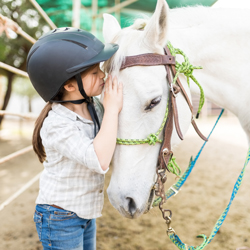Hefty NIH Grant Approved for Colorado Researcher Studying Why Therapeutic Riding Benefits Autism
 The University of Colorado Anschutz Medical Campus announced that CU researcher Robin Gabriels has received a Federal grant to study the reasons why therapeutic horseback riding (THR) is effective for children with autism. The grant follows studies by Gabriels showing THR improves irritability, hyperactivity, and social communication skills, and that the effect lasts at least 6 months after the riding stops.
The University of Colorado Anschutz Medical Campus announced that CU researcher Robin Gabriels has received a Federal grant to study the reasons why therapeutic horseback riding (THR) is effective for children with autism. The grant follows studies by Gabriels showing THR improves irritability, hyperactivity, and social communication skills, and that the effect lasts at least 6 months after the riding stops.
The grant, for $2.5 million over 5 years, comes from the Eunice Kennedy Shriver National Institute Of Child Health & Human Development of the National Institutes of Health. Study sites are in Colorado and Maine.
The study population is comprised of youth with autism age 6-16 years who have a co-occurring psychiatric disorder. The majority of people with autism have mental health issues which cause much of the disability and cost of the disorder. The study will include a subgroup of those recently hospitalized for severe psychiatric issues to explore the impact of THR on this vulnerable group.
The standard riding program lasts 10 weeks, but the study will also look at the impact of a shorter 5-week program. Study participants will be randomized to an active riding group and a control group which engages in barn activities but not riding. Physiological response patterns including salivary cortisol, cardiovascular, and electrodermal activity will be captured to see if these underlie the observed behavioral responses.
“We hypothesize that our manualized THR approach regulates/conditions physiological arousal levels in the ASD population and is at least partially responsible for our previous observations of beneficial THR outcomes,” Gabriels said. She notes that emotional regulation through THR may lower the need for medications and reduce hospitalizations.
References
David Kelly. Grant To Help CU Anschutz Researcher Learn Why Therapeutic Horseback Riding Benefits Autistic Children. Office of Communications. CU Anschutz Medical Campus. Publish Date January 21, 2020.
National Institute of Child Health and Human Development. Physiological mechanisms of action relating to immediate and long-term therapeutic horseback riding intervention effects in a psychiatric population of youth with autism spectrum disorder. Award Number: R01HD097693.
Gabriels, R. L., Pan, Z., Dechant, B., Agnew, J. A., Brim, N., & Mesibov, G. (2015). Randomized Controlled Trial of Therapeutic Horseback Riding in Children and Adolescents With Autism Spectrum Disorder. Journal of the American Academy of Child and Adolescent Psychiatry, 54(7), 541–549. doi:10.1016/j.jaac.2015.04.007.
Germone MM, Gabriels RL, Guérin NA, Pan Z, Banks T, O’Haire ME. Animal-assisted activity improves social behaviors in psychiatrically hospitalized youth with autism. Autism. 2019 Oct;23(7):1740-1751. doi: 10.1177/1362361319827411.
Pan, Z., Granger, D. A., Guérin, N. A., Shoffner, A., & Gabriels, R. L. (2019). Replication Pilot Trial of Therapeutic Horseback Riding and Cortisol Collection With Children on the Autism Spectrum. Frontiers in veterinary science, 5, 312. doi:10.3389/fvets.2018.00312


